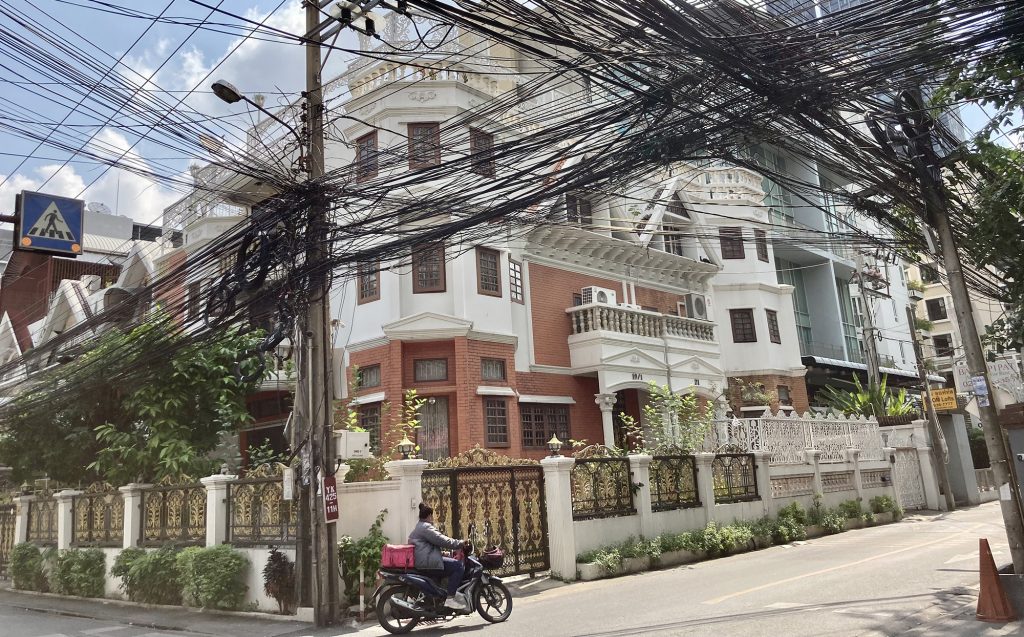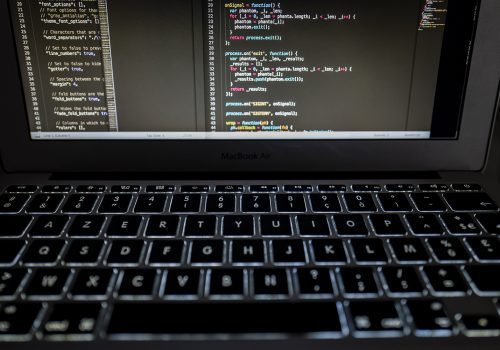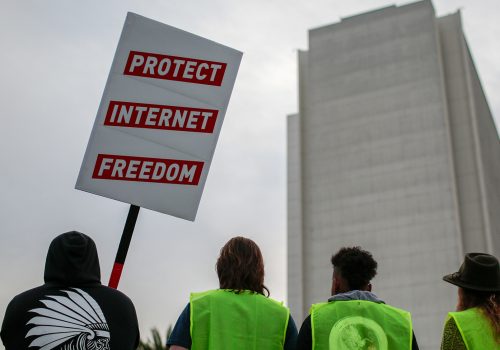On December 7, the Atlantic Council’s Digital Forensic Research Lab (DFRLab) hosted 360/StratCom, its annual government-to-government forum, bringing policymakers and civil-society leaders together to drive forward a democratic tech agenda for the increasingly interconnected world—and ensure that is rights-respecting and inclusive.
The day kicked off with a panel on anti-lockdown protests and dissent in China moderated by Kenton Thibaut, DFRLab’s resident fellow for China. Following a deadly fire at a residential building in Xinjiang, protests erupted in cities across China, including on almost eighty university campuses. While the protests have been fueled by frustration with China’s strict zero-COVID policy, Xiao Qiang, a research scientist at the University of California, Berkeley, noted the protests have also grown to object to censorship and Xi Jinping’s leadership. The protests mark the failure of Xi’s “prevention and control” security approach, added Sheena Greitens, associate professor at the University of Texas. “It was really interesting, and I imagine troubling, from the standpoint of China’s leaders, to see that model fail initially at multiple places, multiple cities in China when these protests broke out,” she said. While the panelists agreed that China has publicly used a lighter touch in dealing with the protest organizers than it has historically, they expressed concern that this is because surveillance technology provides authorities the ability to identify and target protesters behind closed doors. Maya Wang, associate director of the Asia division at Human Rights Watch, said an important takeaway from the protests is that many people in China seek democracy.
Next up was a discussion about the Freedom Online Coalition (FOC), a global alliance in pursuit of a democratic tech agenda that ensures a free, open, secure, and interoperable internet for all. With Canada serving as the current chair of the FOC, the session began with remarks from Canadian Deputy Foreign Minister David Morrison. He noted that what unites the FOC is the belief that one of the most pressing challenges is finding a way to benefit from digital technology in a way that protects human rights and upholds democratic values. Morrison noted four essential components of digital inclusion: connectivity, digital literacy, civic participation, and online safety.
With the United States preparing to serve as the incoming FOC chair, Anne Neuberger, deputy national security adviser for cyber and emerging technologies at the White House, also gave her thoughts on the democratic tech agenda. Neuberger noted that, while the internet has transformed the world, it has also led to a series of troubling developments. “The internet remains a critical tool for those on the front lines of the struggle for human rights, activists; and everyday people from Tehran to Shanghai to Saint Petersburg depend on access to an unblocked, unfiltered internet to communicate and gain information otherwise denied to them by their government.” As FOC chair, the United States will have three main priorities, Neuberger outlined: bolstering existing efforts where the FOC adds unique value, such as condemning governments that misuse technology; strengthening coordination between FOC policies and the foreign assistance that participating states are providing to ensure that national-level technology frameworks around the globe are in alignment with human rights; and strengthening the FOC’s operating mechanics to ensure the organization can have a greater impact in the years to come.
Another vital goal for the FOC is to recognize and articulate the connection between pluralistic, open societies and a secure, open internet, said Katherine Maher, nonresident senior fellow at the DFRLab and former chief executive officer of Wikipedia. In a panel focusing on how the FOC can live up to its promise , Maher noted that an open internet is a means to an end, as it helps people protect human rights. Moderator Jochai Ben-Avie, chief executive of Connect Humanity and a DFRLab nonresident fellow, echoed this sentiment. “Never before has the call been louder for democratic countries to take coordinated action in defense of a free and open and secure and interoperable internet,” he noted.
Read more
Later in the day, the discussion shifted to the European Union’s (EU) approach to tech governance in a session moderated by Rose Jackson, director of the DFRLab’s Democracy and Tech Initiative. Gerard de Graaf, the European Union’s first ambassador to Silicon Valley, remarked on recent tech industry layoffs, saying that he had been reassured by some tech companies that the cuts would not affect compliance with European regulations. “In the industry, there is an awareness that it’s probably not so wise to start cutting into the areas where, frankly, you probably now need to step up rather than reduce your resources,” he said.
Meanwhile, Prabhat Agarwal, one of the lead drafters of EU tech legislation and head of unit at the EU’s DG CONNECT Digital Services and Platforms, said that he is working on designing transparency provisions. He noted three key areas that these provisions will cover: user-facing transparency to ensure tech platforms’ terms and conditions are so clear “that even children can understand”; expert transparency that would allow civil society, journalists, and academics the ability to access data intrinsic to their research; and regulator transparency that would enable governments to inspect what happens “under the hood” of the platforms.
To close out this year’s 360/StratCom programming, Safa Shahwan Edwards, deputy director of the DFRLab’s Cyber Statecraft Initiative, led a conversation with Camille Stewart Gloster, US deputy national cyber director for technology and ecosystem. The discussion centered on how to define and grow a competitive tech workforce. Stewart Gloster noted that technology underpins each person’s life, and it is imperative to raise the collective level of understanding of the tradeoffs people around the world make daily, from privacy to security.
Layla Mashkoor is an associate editor at the DFRLab.
Further reading
Wed, Dec 7, 2022
Camille Stewart breaks down the Office of the National Cyber Director’s whole-of-society strategy
Transcript By
Camille Stewart Gloster, the inaugural deputy national cyber director for technology & ecosystem, is defining the role that the United States' new Office of the National Cyber Director can play.
Wed, Aug 24, 2022
Chinese discourse power: Ambitions and reality in the digital domain
In-Depth Research & Reports By Kenton Thibaut
The CCP has embarked on a concerted strategy to gain control over the global digital and information environment. Its goal: create an alternative global order with China at its heart.
Thu, Dec 8, 2022
The call for coordinated action for a free, open, and interoperable internet
360/StratCom By
The DFRLab, as part of its annual 360/StratCom event, convened a discussion about the FOC, including the need to coordinate action to protect a free, open, secure, and interoperable internet.
Image: Cable clutter in the center of Bangkok. Photo by Carola Frentzen/dpa via Reuters.




